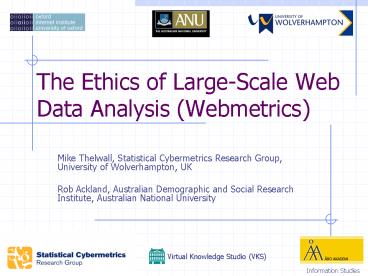The Ethics of Large-Scale Web Data Analysis (Webmetrics) - PowerPoint PPT Presentation
Title:
The Ethics of Large-Scale Web Data Analysis (Webmetrics)
Description:
Title: Presentation Last modified by: Thelwall Created Date: 1/1/1601 12:00:00 AM Document presentation format: On-screen Show Other titles: Times New Roman Tahoma ... – PowerPoint PPT presentation
Number of Views:98
Avg rating:3.0/5.0
Title: The Ethics of Large-Scale Web Data Analysis (Webmetrics)
1
The Ethics of Large-Scale Web Data Analysis
(Webmetrics)
- Mike Thelwall, Statistical Cybermetrics Research
Group, University of Wolverhampton, UK - Rob Ackland, Australian Demographic and Social
Research Institute, Australian National University
Virtual Knowledge Studio (VKS)
Information Studies
2
Contents
- What is webmetrics?
- Context Online access to personal information
- Researchers use of personal information
- Confidentiality and anonymity
- Resource issues
- What ethical considerations apply to collecting
and analysing web data on a large scale from
unaware web publishers ?
3
1. What is webmetrics?
- Large-scale analysis if web-based data
- Collecting and quantitatively analysing online
information - Objective is not to find information about
individuals but identify trends - Data gathered with VOSON, SocSciBot, Issue
Crawler, LexiURL,
4
Example
- VOSON Hyperlink
- network of
- political parties
- from 6 countries
- (Ackland and
- Gibson, 2006).
- Node size prop.
- to outdegree.
- 76 nodes.
5
Austria
Geopolitical connected
Switzerland
Example Links between EU universities
Belgium
Germany
France
Spain
NL
UK
Norway
Italy
Poland
Finland
Sweden
AltaVista link searches
Normalised linking, smallest countries removed
6
Link associations between social network sites
7
Example Blog searching
8
2. Context Online access to personal information
- Blogs, social network sites, personal web sites
contain information that is - Private and protected (invisible to researchers)
- Intentionally public
- Publicly private1 (intended for friends but
allowed to be public) - Unintentionally public (public but believed by
owner to be private)
1. Lang (2007)
9
Accessing public information
- Commercial search engines
- Web crawlers
- Internet Archive (includes deleted info)
10
Who is using Dataveillance?
- Dataveillance1 Downloading or otherwise
gathering data on internet users in order to
influence their behaviour - Google can use email, searching, blogging,
social network activities to target advertising
( may report to US government) - Amazon can use past activities to target
adverts or improve web site
1. Zimmer (2008)
11
3. Researchers use of personal information
- Key issue for large scale research, data
from/about the unaware is used without their
approval, and possibly for purposes that they
might disagree with - Which ethical safeguards should be taken for this
kind of research?
12
Issue 1 People vs. Documents
- Traditionally, documents can be researched
without approval, but people cant - Even harsh criticism is fair practice (e.g., book
review/analysis) - Since web pages are documents, researching them
without permission is normally OK
13
Issue 2 Invasion of privacy? Natural vs.
normative
- A situation is naturally private1 if a reasonable
person would expect privacy - A situation is normatively private1 if a
reasonable person would expect others to protect
their privacy - Non-secure web pages/data are typically naturally
private - Accessing is not normally invading privacy, even
if undesired by page owners and with negative
consequences
1. Moor (2004)
14
4. Confidentiality and anonymity
- When should anonymity be granted to research
subjects (page owners)? - When a possibly undesired label attached (e.g.,
hate group, terrorist) - When undesired groups might benefit? (e.g.,
league table of hate groups) - When publicly private individuals singled out
(e.g., detailed analysis of average blogger) - Should data be anonymised as for Census data
used for research?
15
5. Resource issues
- Accessing a web page uses the owners server
time/bandwidth - Crawling a web site can use a lot of the owners
server time/bandwidth - May incur charges or loss of service quality
16
Robots.txt protocol
- This file lists pages/folders in a web site may
not be crawled - It does not restrict crawling speed
- It should be obeyed in research
- Most individual users are probably unaware of
this and so dont use its protection
17
Crawling speed
- Web crawlers should not run too fast that they
cause service issues - Full speed is probably OK on a UK university web
site but not on a Burkina Faso library web site - Use judgement to decide how quickly to crawl
length of pauses in crawling
18
How many pages to crawl?
- Crawling too many pages puts unnecessary strain
on the server crawled - Use judgement to decide the minimum number of
pages/crawl depth that is enough - Use search engine queries as a substitute, if
possible
19
Automatic search engine searches
- Research can piggyback off the crawling of
commercial search engines - No resource implications for site owners
- Uses search engine Applications Programming
Interfaces - Search engines specify the maximum number of
searches per day - Results limited to the imperfect web
crawling/coverage of search engine crawlers
20
Summary
- Researchers need to be aware of potential issues
when doing large scale data analysis research - Judgement is called for in all issues
- Research does not normally need participant
permission - Be sensitive to impact of findings and any need
for anonymity
21
References
- Lange, P. G. (2007). Publicly private and
privately public Social networking on YouTube.
Journal of Computer-Mediated Communication,
13(1), Retrieved May 8, 2008 from
http//jcmc.indiana.edu/vol2013/issue2001/lange.ht
ml - Zimmer, M. (2008). The gaze of the perfect search
engine Google as an infrastructure of
dataveillance. In A. Spink M. Zimmer (Eds.),
Web search Multidisciplinary perspectives (pp.
77-99). Berlin Springer. - Moor, J. H. (2004). Towards a theory of privacy
for the information age. In R. A. Spinello H.
T. Tavani (Eds.), Readings in CyberEthics (2nd
ed., pp. 407-417). Sudbury, MA Jones and
Bartlett.































